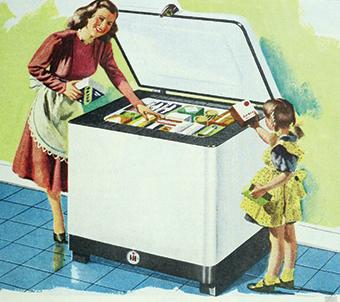
How to Manage Your Freezer Backstock

Most of us take our freezers for granted. They’ve been around for nearly a century, and we’ve lost our sense of wonder, but freezers are a transformative technology. Whether it’s a small freezer-refrigerator combo or a standalone model, this appliance vastly multiplies how much food a family can safely keep on hand and extends its shelf life exponentially.
Freezers are great for stocking up when foods are on sale or in season. Tossing leftovers into the freezer prevents the spoil-and-toss pattern with which we are all familiar. Planful cooks use the freezer to prepare food when time is abundant, defrosting it when time is tight. Doubling a recipe is not twice as much work, and stashing half in the freezer provides a future meal. In a way, this is freezing your labor and thawing it later, a kind of magic.
Using a freezer provides all these benefits, but it has a significant downside. We all tend to stash UFOs — Unidentified Frozen Objects — that will later require significant research to identify. Foods that are stored too long dry out and develop an off taste. Generally, food stored more than six months will have declined in appeal. Thus, managing one’s freezer stock requires two kinds of discipline: labeling food, ideally with a date, and systematically consuming what is stored before it loses quality.
My family observes Passover fairly strictly. This means getting rid of leavened bread, baked goods and pasta in advance of the holiday. In time, I realized this challenge afforded an opportunity to make sure nothing in our freezer was there more than a year, reducing our food waste.
How long does it take to empty a refrigerator freezer? After several years of trying and failing to do it in the month before Passover, I now know it takes me about two months.
You don’t need to observe Passover to test this out at your house. The first step is to stop purchasing frozen food; instead, eat out of the freezer. Many of us have freezers so stuffed it’s hard to know what the hell is in there. Reducing the contents makes it easier to see what you actually have. Experts on reducing food waste observe that we eat what we see. Hence, discovering long-hidden foods will encourage you to consume them before they are too old to be appealing and wind up in the waste stream.
If you get serious about emptying your freezer annually, you then need to plan meals around what you already have, instead of shopping for new foods. This may require some creativity.
We have created a hashtag for folks who want to empty their freezers as a spiritual process: #ZeroWastePassover. All are invited to post “before” and “after” pictures on Instagram, where we can support each other in this challenge.
Betsy Teutsch is the author of the upcoming “100 Under $100: Tools for Reducing Postharvest Losses.”
